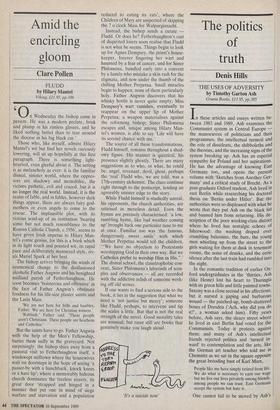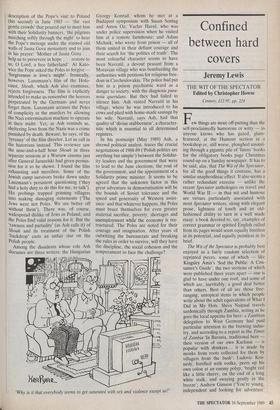The politics of truth
Denis Hills
THE USES OF ADVERSITY by Timothy Garton Ash
Granta Books, £13.95, pp.305
In these articles and essays written be- tween 1983 and 1989, Ash examines the Communist system in Central Europe — the manoeuvres of politicians and their programmes, the intellectual turmoil and the role of dissidents, the shibboleths and the theories, and the increasing signs of the system breaking up. Ash has an especial sympathy for Poland and her aspirations. He has the advantage of knowing East Germany too, and opens the present volume with 'Sketches from Another Ger- many' and a critical study of Brecht. Asa post-graduate Oxford student, Ash lived in east Berlin while researching his doctoral thesis on 'Berlin under Hitler'. But the authorities were so displeased with what he wrote that they put Ash on the black list and banned him from returning. His de- scription of the poor working-class district where he lived has nostalgic echoes of Isherwood: the washing draped over crumbling balconies, the bars, the young men whistling up from the street to the girls waiting for them at dusk in tenement rooms, the noise of drunks, and the eerie silence after the last train had rumbled into the night.
In the romantic tradition of earlier Ox- ford undergraduates in the 'thirties, Ash (like Heine) lost his heart to Thuringia with its green hills and little painted towns. Saxony was a close second in his affections; but it nursed a gaping and barbarous wound — the patched-up, bomb-shattered bones of Dresden ('Ach, why did you do it?', a woman asked him). Fifty years before, Ash says, the sleazy street where he lived in east Berlin had voted for the Communists. Today it protests against them: and many of Ash's intellectual friends rejected politics and 'turned in- ward' to contemplation and the arts, like the German art teacher who told me in Chemnitz as we sat in the square opposite the great brooding bust of Karl Marx,
People like me have simply retired from life. We do what is necessary to earn our wage but we live our lives privately among friends, among people we can trust. East Germans accept the system but hate it.
One cannot fail to be moved by Ash's description of the Pope's visit to Poland (his second) in June 1983 — 'the vast gentle crowds' that poured out to meet him with their Solidarity banners, 'the pilgrims marching softly through the night' to hear the Pope's message under the stained old walls of Jasna Gora monastery and to join in his prayer: 'Mother of Jasna Gora . . . help us to persevere in hope . . . restore to us, 0 Lord, a free fatherland'. At Kato- wice the Pope asked the Poles to forgive — 'forgiveness is love's might'. Ironically, however, Lanzmann's film of the Holo- caust, Shoah, which Ash also examines, rejects forgiveness. The film is explicitly intended to make us remember the horrors perpetrated by the Germans and never forget them. Lanzmann accuses the Poles of complicity in the murders by allowing the Nazi extermination machine to operate in their midst. Yet, as Ash reminds us, sheltering Jews from the Nazis was a crime Punished by death. Beware, he says, of the 'tyranny' of the film director. Let us call in the historians instead. This reviewer saw the nine-and-a-half hour Shoah in three separate sessions at a Warsaw cinema just after General Jaruzelski had given permis- sion for it to be shown. I found the film exhausting and merciless. Some of the Jewish camp survivors broke down under Lanzmann's persistent questioning (`they had a holy duty to do this for me, to talk'). His probings trapped grinning villagers into making damaging statements (`The Jews were not Poles. We are better off Without them'). There was, of course, Widespread dislike of Jews in Poland, and the Poles find valid reasons for it. But the 'rawness and partiality' (as Ash calls it) of Shoah and its treatment of the Polish 'backdrop' casts an unfair slur on the Polish people.
Among the dissidents whose role Ash discusses are three writers. the Hungarian
Gyorgy Konrad, whom he met at a Budapest symposium with Susan Sontag and Amos Oz; Vaclay Havel, who was under police supervision when he visited him at a remote farmhouse; and Adam Michnik, who wrote from prison — all of them united in their defiant courage and their search for 'the politics of truth'. The most colourful character seems to have been Navratil, a devout peasant from a Moravian village who was bombarding the authorities with petitions for religious free- dom in Czechoslovakia. The police had put him in a prison psychiatric ward as a danger to society, with the diagnosis para- noia querulans. But they had failed to silence him. Ash visited Navratil in his village, where he was introduced to his cows and plied with home-made sausage by his wife. Navratil, says Ash, had that quality of 'divine stubborness', a character- istic which is essential to all determined registers.
In his postscript (May 1989) Ash, a shrewd political analyst, traces the crucial negotiations of 1988-89 (Polish politics are anything but simple') between the Solidar- ity leaders and the government that were to lead to the June elections, the rout of the government, and the appointment of a Solidarity prime minister. It seems to be agreed that the unknown factor in this great adventure in democratisation will be the bounds of Soviet tolerance and the speed and generosity of Western assist- ance: and that whatever happens, the Poles must brace themselves for even greater material sacrifice, poverty, shortages and unemployment while the economy is res- tructured. The Poles are noted for their courage and imagination. After years of outwitting the bureaucrats and breaking the rules in order to survive, will they have the discipline, the social cohesion and the temperament to face the challenge?
'Why is it that everybody seems to get saturated with sex and violence except us?'



































































 Previous page
Previous page